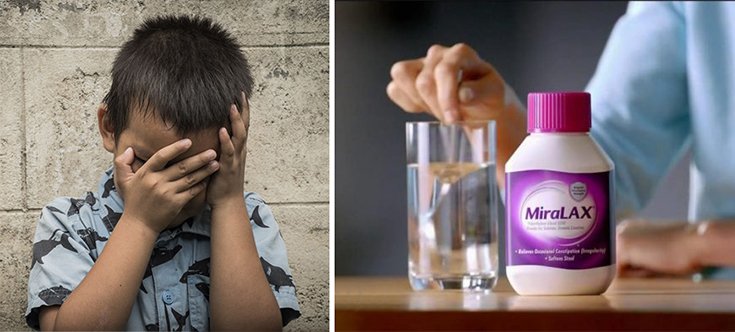Parents: MiraLAX Causes “Neuropsychiatric Problems” in Children

The laxative product MiraLAX seems harmless enough. Doctors recommend it and it can be purchased over-the-counter at any pharmacy. It’s not the sort of product you would think could cause serious mental problems in children, but many parents claim such side effects are real; they’ve seen it with their own eyes.
In 2014, the FDA awarded a grant to CHOP to study the purported hazards of MiraLAX use in children. At that time, the agency also disclosed that MiraLAX powder contains lesser amounts of polyethylene glycol 3350, or PEG 3350.
Under certain conditions, PEG 3350 degrades into ethylene glycol or diethylene glycol. If any of those sound familiar to you, it’s probably because they’re toxic ingredients found in antifreeze.
The FDA said in its grant description:
“The Food and Drug Administration has received a number of reports of adverse events in children taking PEG products. The Agency has conducted a review that documented a number of reports of neurological and psychiatric events associated with chronic PEG use in children. A number of these pediatric patients received an adult dose of PEG (17 grams) for a duration ranging from a few days to a couple of years.” [1]
The FDA has found 167 cases of adverse side effects in children who took MiraLAX, including 37 kids who displayed neurological or psychiatric problems. Although the agency won’t discuss its findings thus far, it says it has determined that there is “insufficient data to demonstrate a link between PEG 3350 and serious neuropsychiatric issues in children.” [1], [2]
But parents say they know MiraLAX ruined their children’s live, and have been speaking out on social media about the devastating side effects they claim their child experienced after using the product.
Many parents have expressed their experiences and concerns in a private Facebook group called Parents Against MiraLAX (PEG 3350). Nearly 13,000 parents have come together to swap stories there and discuss a particularly worrisome ingredient found in the medication. (Membership numbers have jumped significantly in recent days.) The page’s description reads:
“We are a group of parents and family members who are highly suspicious of PEG 3350 and are here to discuss its cons. We discuss alternative options and ways to talk to doctors about our opposition to this very dangerous drug. We are not a replacement for the type of health care you choose, we only speak from experience. You have to make your own choices and decisions based on your child and research.” [1]

Bayer-made MiraLAX is not recommended for children under age 17, but many doctors recommend it to parents anyway, according to the FDA. It’s even recommended off-label to infants and toddlers. It’s recommended for short-term use up to 7 days to relieve constipation. The FDA has not approved chronic use of the laxative. [2]
Maddening Consequences
Parents told ABC 6 Action News in Philadelphia that their child became unrecognizable after taking MiraLAX. Gone were the carefree, giggly days of childhood. The sun set, and it became permanently night.
Said parent Mike Kohler:
“We saw a lot of the anger, a lot of the rage, a lot of the aggression.” [2]
Said parent Jessica Aman:
“I feel like my son was absolutely robbed of most of his childhood.”
Parent Sarah Locatelli said:
“He had the rage, fears, phobias, anxieties.”
Said parent Jeanie Ward:
“Near psychiatric events with paranoia, mood swings, aggression, rage.”
Ward’s daughter, Nicole, was just 3-1/2 when she was placed on MiraLAX. Within 10 days, the young child became manic, aggressive, and paranoid. It was a terrifying transformation to behold, made even worse by the fact that she never completely went back to her happy, carefree self. [2], [3]
Now 19, Nicole remembers the changes well:
“I was a very, very happy child. When I was 2, I was running around playing. In second grade I started hating everybody. I wanted to kill everybody. I’m mad that this happened to me.” [2]
Ward said:
“I think they are poisoning our children.”
Ward helped author a 2012 citizen petition that calls for a recall of laxatives using PEG 3350; it also called for a black box warning against the use of such drugs in children. The parents are also pushing for an investigation into the long-term effects of short-term PEG 3350 use, particularly in pediatric patients.
In response, the FDA says:
“The FDA takes the health and welfare of pediatric populations seriously. To date, the agency’s reviews of adverse event reports and medical literature indicate that the approved labeling for PEG 3350 products accurately conveys their risks, and additional warnings regarding neuropsychiatric issues in children are not warranted at this time.
However, because many parents and physicians rely on these products to treat serious constipation, we have decided to fund research to better determine the benefits and risks associated with the use of these products in children.
The study is ongoing, but the agency believes that data from the CHOP study will help FDA balance the needs of two distinct constituents we serve: those who are concerned about the potential health effects on children who take PEG 3350 products, particularly those who use them chronically; and those pediatric patients and their parents who, in consult with their physicians, need safe and effective drugs to alleviate the often very serious complications associated with childhood constipation.”
In 2015, The New York Times published an article about the safety of MiraLAX for pediatric use. According to the piece, doctors have always felt comfortable recommending MiraLAX for kids on the grounds that very little PEG 3350 is absorbed in the intestines.
However, the FDA says there is little data on its absorption in children, especially the very young and chronically constipated, the Times reported.
[1] Philly Voice
[3] Cox Media Group
